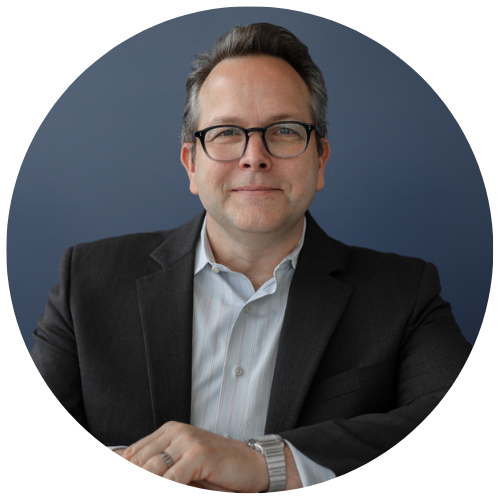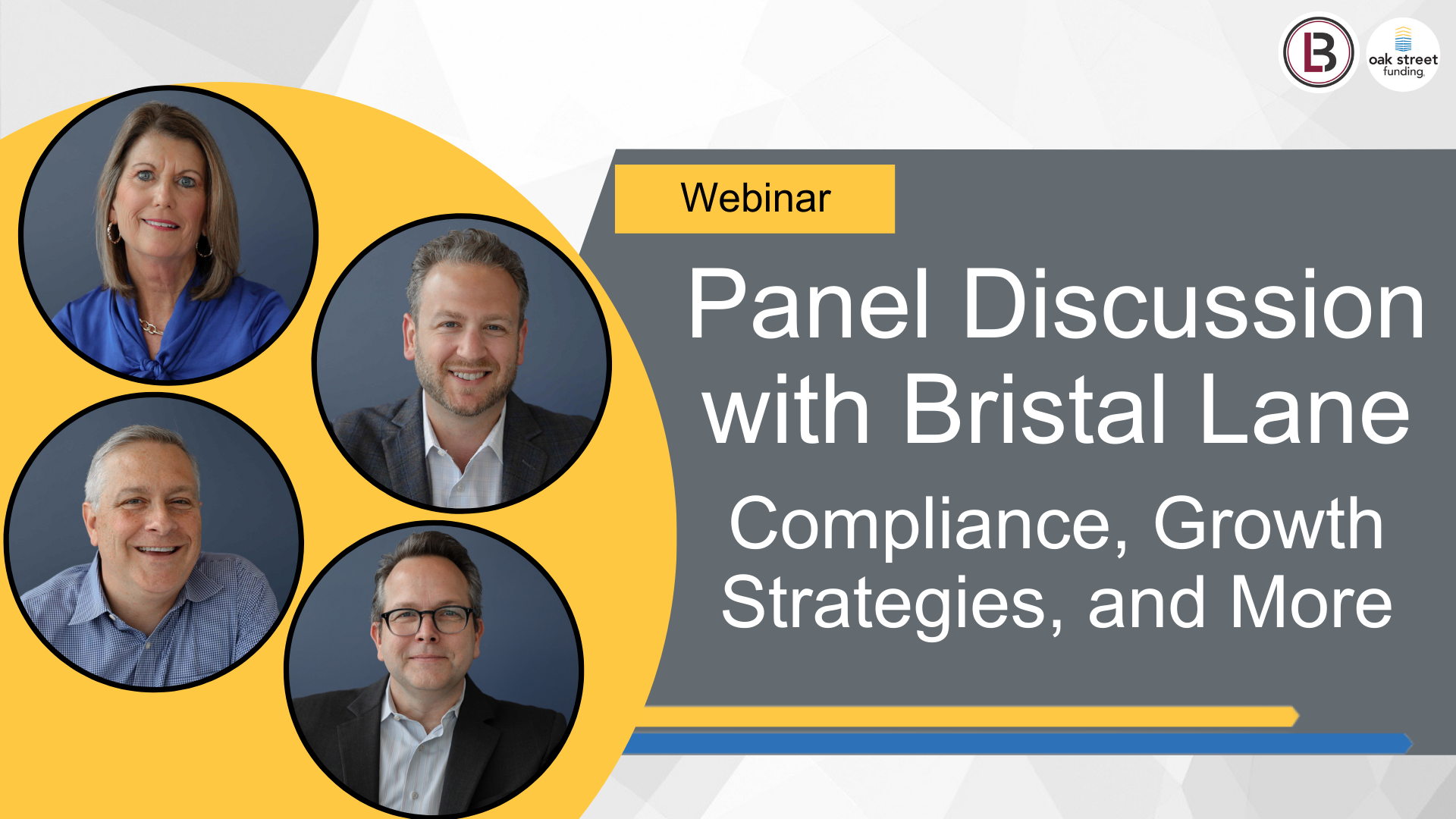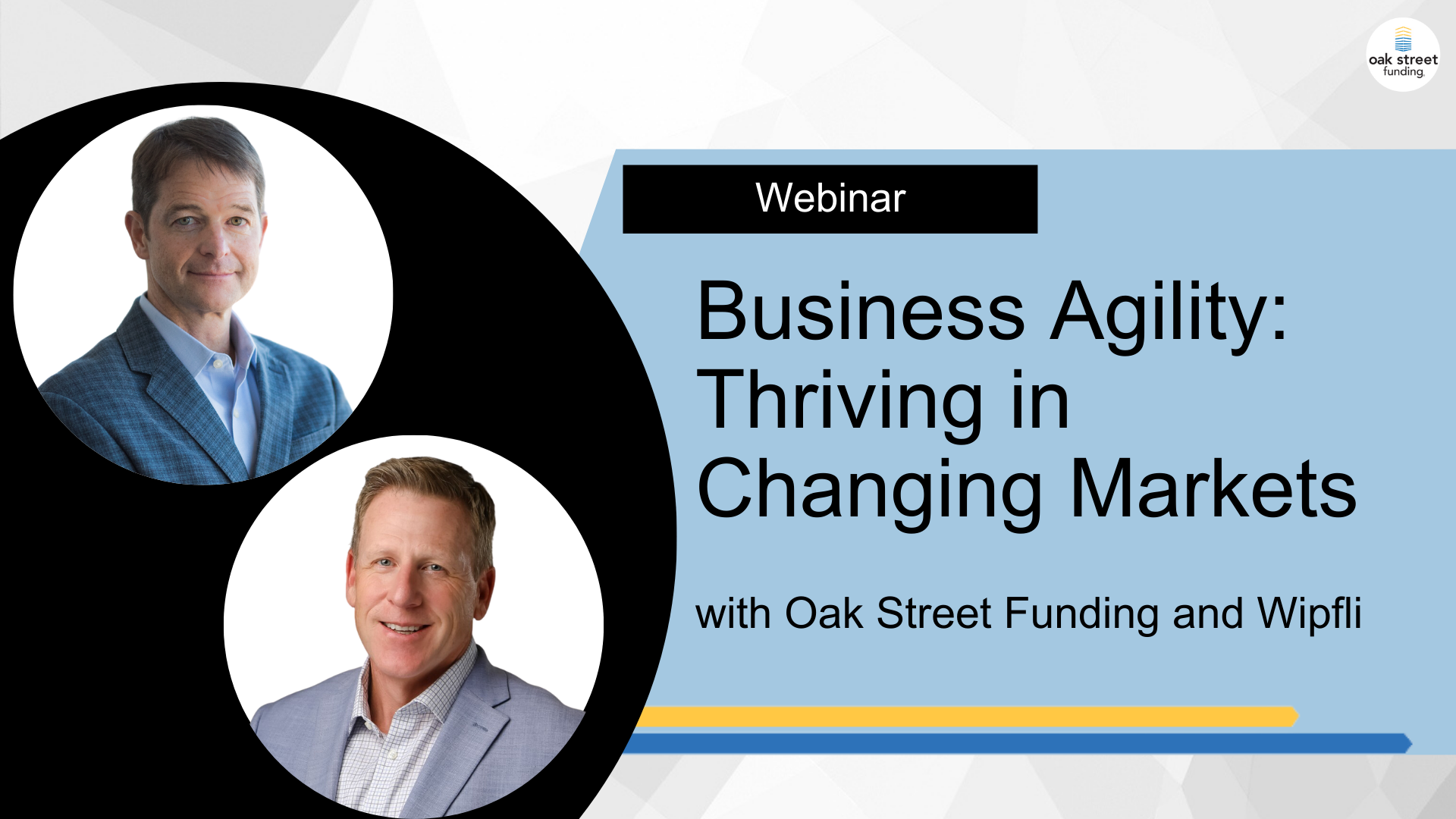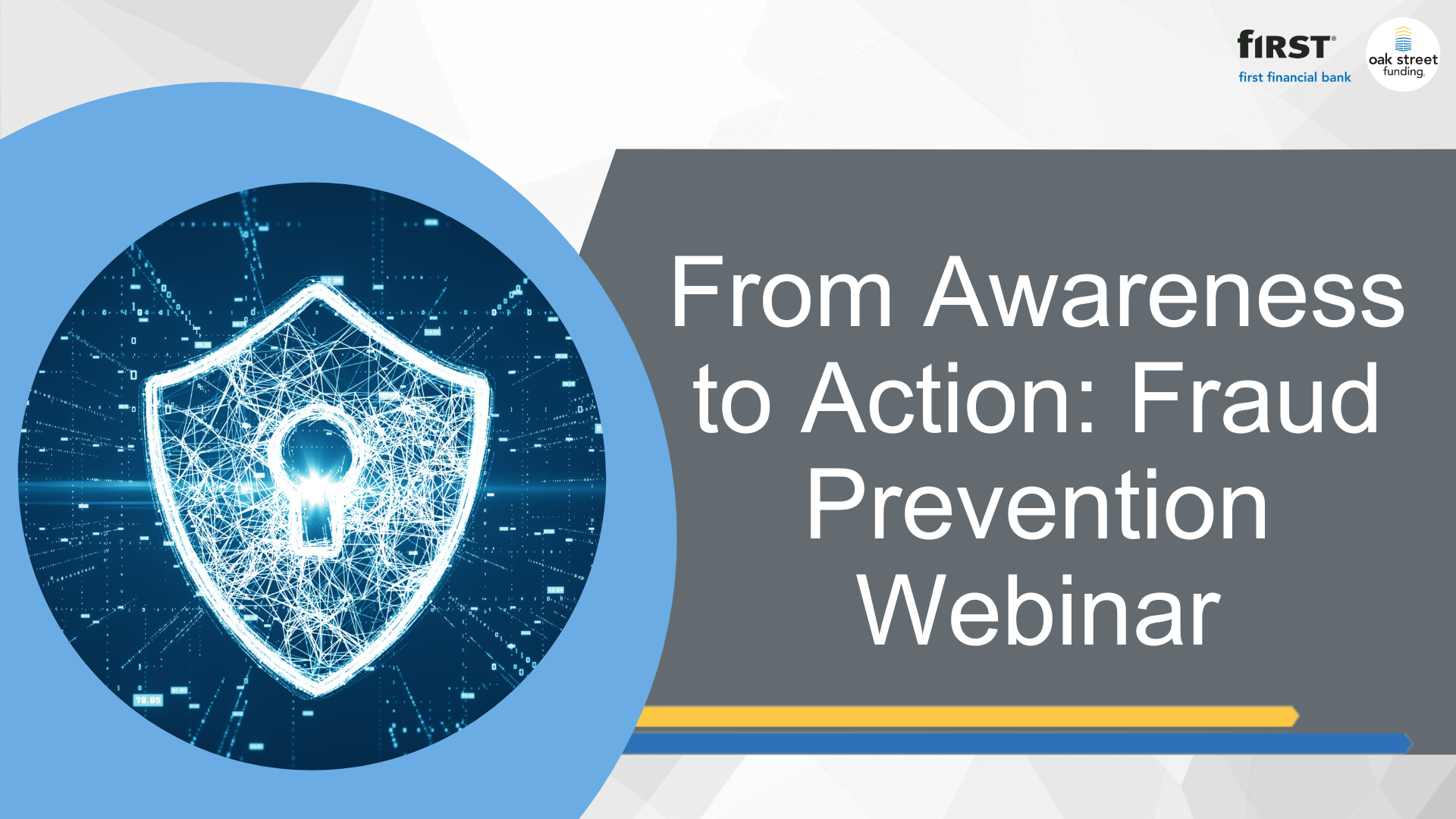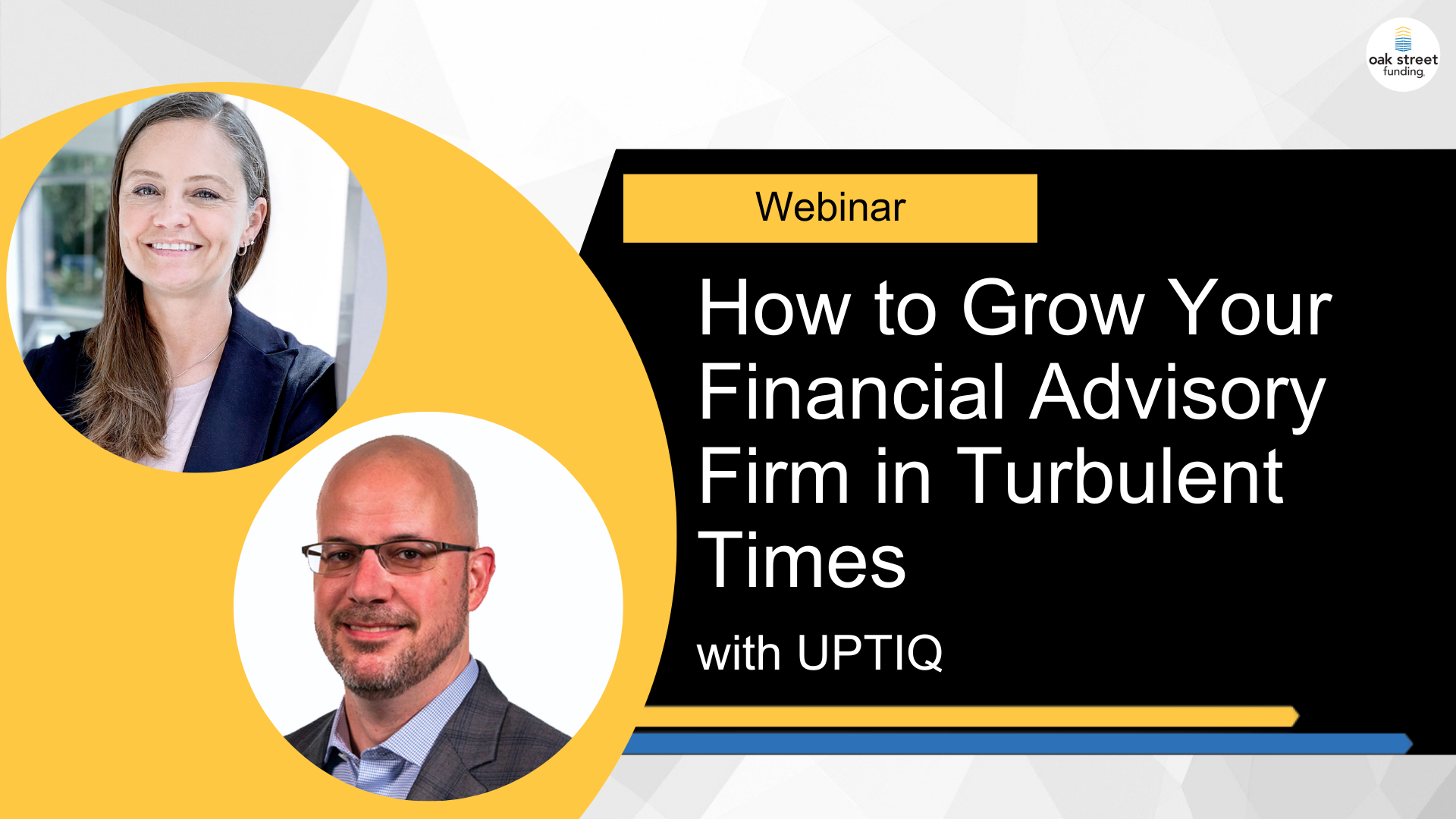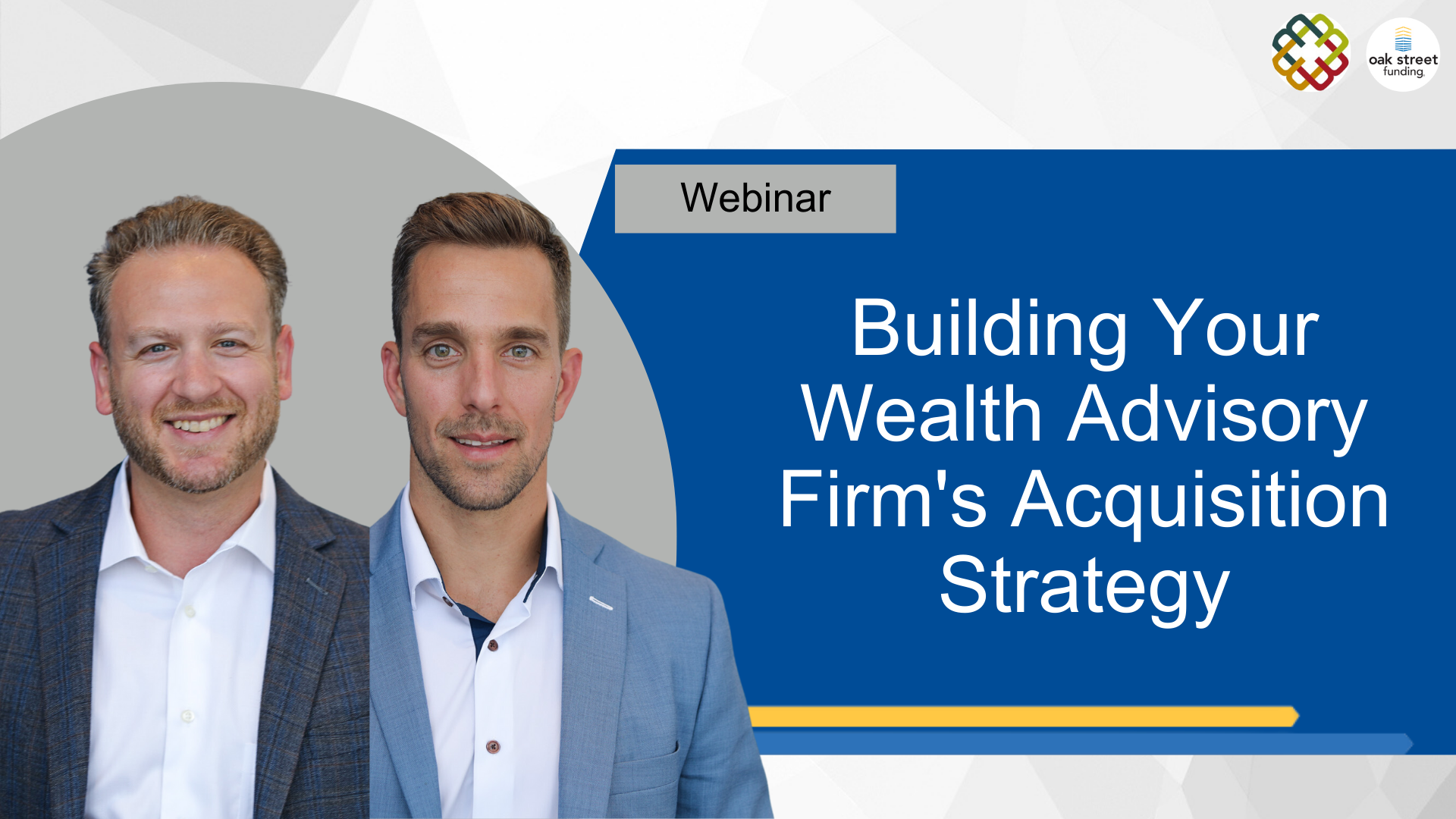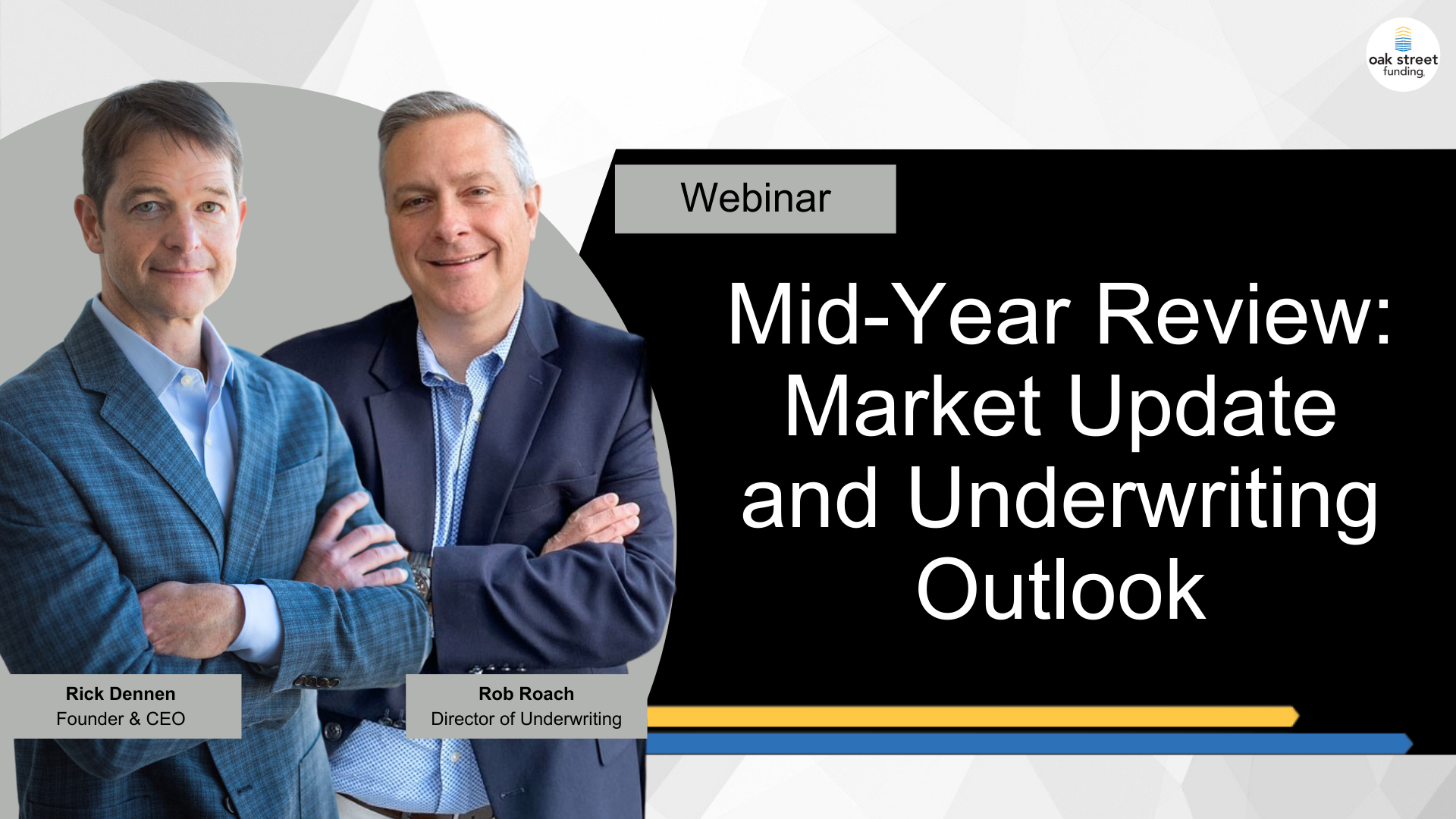Panel Discussion with Bristal Lane: Compliance, Growth Strategies, and More
- 0.5
- 1
- 1.25
- 1.5
- 1.75
- 2
Susie McEuen: Hi, everyone. Thank you so much for joining us today for our panel discussion webinar. My name is Susie McEuen. I'm the Vice President of Strategic Market Sales at Oak Street Funding. I focus primarily on providing capital to advisors and RIAs. And I've been following the market and I'm listening to you, the questions that you've had, and I thought it'd be a great idea to bring together my colleagues and one of our partners to help answer some of the questions we all are hearing at this time. First, let's start with introductions. Rob?
Rob Roach: Sure. I'm Rob Roach. I'm the Director of Underwriting at Oak Street. I've been here about six years, after spending about 20 years in corporate banking. And really lead a team of experienced underwriters that underwrite new transactions for prospects, and really monitor the financial performance of our existing client base.
Adam Farag: Hi, I'm Adam Farag, Vice President of Strategic Markets here at Oak Street Funding. Been here about six years, mainly lending to RIAs and CPAs.
Matt Reynolds: I'm Matt Reynolds. I am the Founder and President of Bristal Lane Group. Our firm is focused on compliance, accounting and transition support for broker dealers, RIAs, and other financial institutions across the country.
Susie McEuen: Matt and I have been working together for many years, probably like five years or so?
Matt Reynolds: At least. Yeah.
Susie McEuen: Yes. And it's been a great partnership. And I'm excited to have this group here today, as we're going to answer some of those questions around compliance, growth strategies, and through this group discussion. So I'm just going to start by going with a question to lead us off. I've been hearing from nearly all of our clients, how has lending landscape changed in the past year and what impact has this had on the makeup of the deals? And one of the things also, besides those questions, in the last two weeks, 10 days, we have been experiencing a lot of change with interest rates, the Feds met, Prime went up 25 basis points, we're now at 8% and that is the highest it's been since 2007. So there are a lot of advisors, CPAs out there, that may have not experienced some of the things we're experiencing now. And then, particularly the recent bank failures with Silicon Valley and also Signature. So there's been a lot of things happening, even since we set these questions out, and I think it's really important that we provide some comments as far as questions that you might have. Oak Street Funding, we're a subsidiary of First Financial Bank. And First Financial Bank is headquartered in Cincinnati. It's a $17 billion bank, been around since I think 1853. And so, we have a lot of information that's out on our website as far as the stability and the ratings of our bank. But the one thing I want to do is pass it over to Rob Roach, our Director of Underwriting, because he can speak to where we are as far as our lending capabilities and what has happened recently in the market.
Rob Roach: There's been a lot of change obviously in the marketplace in the last year, and especially in the last several weeks, people are concerned about the financial condition of their partners. I feel very fortunate to be with a strong company that really hasn't had to change a great deal of our lending model. We've had a great lending model since we've started. And being established in all the verticals that we compete in, it really has allowed us to be consistent, which is what our clients like, the consistency that we can give them.
Adam Farag: And I think also, to add to that, I think our underwriting goes a whole lot further than just the numbers, and I think that's a big part of it. When you see Prime jump 400 basis points in a year, you know have to look at the structure of the deal more than you do the valuation or as much. And I think that's what we've seen here in the last year or so is a lot of the deals are a little bit differently structured, where there's maybe less of a cash consideration up front, a little bit more contingent on performance post close. And I think that's a big part of underwriting here is looking at the thing holistically and not just the valuation and the upfront numbers.
Matt Reynolds: So when you're lending, most people know mortgages, they know of car, what's it like to actually change that purview and say, " All right, now we're lending against a practice," or something like that, how has the interest rate affected that decision- making?
Rob Roach: You know, I think it's not changed a good deal into a bad deal necessarily. People are still doing, obviously, doing transactions. What it's changed for us, in our analysis, we've always used some sensitivity. We've always said, what happens if rates go up a little bit? And just using that kind of conservative nature has allowed us to structure things, again, to where we can be consistent. Where we've seen it is, you know, some people have been a little hesitant. They've said, " Hey, is this the right time to borrow money? Is this the right time to do a transaction?" And again, I think that goes back to an increase in interest rate doesn't make a good transaction, a bad transaction. And so working through that, I think, as Adam mentioned, one of the things I think separates us a little bit from our competitors, our underwriters are out there and we're meeting the people. We're visiting folks, we're talking to them on the phone. The underwriter's getting a really good sense for the business. And so, I think that helps us to structure something that works for everybody, even when things change a little bit. As a portfolio lender where we're not selling our loans, we're able to put something together that's unique for everybody. We don't have a standard, here's a one size fits all loan in a box we're trying to fit everybody into.
Adam Farag: Yeah.
Susie McEuen: And I think that's really important because what you just said is we're a conventional lender, we're not an SBA lender. So we have some flexibility, but it's important with you, Matt, to have people that we work, or firms like yours, we want our clients to be surrounded by a professional, a professional team to help them. Because, as you know, there are some advisors that we've worked with, you and I, that don't have that experience in as far as running their business. And your expertise and the services that you provide, I always tell clients that are new as far as starting their own practice that maybe they've been an independent advisor or W-2 CPA, that make sure that you get an attorney, a consultant, a CPA, to help. Because we are the lender, but we can't be all things to all people.
Matt Reynolds: Right.
Susie McEuen: We need your help. And so, we appreciate you being here and being one of our partners.
Matt Reynolds: Well, thank you. In being part of something where someone's going from being a practice owner to being a business owner, I think it's such a big change for them that now you have to think about more than just your clients. You're thinking about taking care of employees, in most cases. You're also thinking about how to grow, how to market. And every one of these areas, there's no way that anyone, no matter how good the advisors are, and they are, there's no way that they can know inherently how to run an operation like that.
Adam Farag: Yeah. I think, just to add to that, to what Rob said too, and I think that's where underwriting these deals is a whole lot different than going to get a home loan or a car loan, or what a lot of borrowers are more experienced in, is just kind of what does the picture look like upfront and that's it. And that can pay for it for the life of however long you have that home or however long you have that car, where this is a moving target. There's a lot more complexities that go along with running a business versus a practice, and how that flows with the market going up and down, with rates changing and things of that nature.
Susie McEuen: And that's where the compliance comes in. And that's where we all have to work together and get help from you as well, is the continuing monitoring and the things that we have to look for to qualify that borrower. And those advisors or businesses that have not borrowed on behalf of their business, they don't realize some of the complexity as far as the things that we look for. We're going to check your taxes, we're going to check your ADV to make sure it's current, and your registration. I just had a borrower yesterday that started their own firm a year ago, and he did not realize that he needed to file again with the state. It's little things like that. And that's where-
Rob Roach: It's organization.
Susie McEuen: Exactly, exactly.
Adam Farag: A lot of times, we'll call it a book versus a business, you know? When you have a business, I think there's many other things that get involved with making sure it's successful going forward. And it's one of the things you're here.
Matt Reynolds: I appreciate it. I will say that the folks that we've talked to, who've worked with you, the nice thing that they can always rely on is you know the business, right? So going back and being consistent with the way that you go about lending, that's important. It's just as important for those people to be able to say, " All right, great. My bank reminded me I have to do this related to compliance." And that's important. In a lot of ways, they rely on you guys as much as anyone else to make sure they're getting it right.
Rob Roach: People want banks to be boring.
Matt Reynolds: Yeah. Yes.
Rob Roach: Boring and predictable. I mean, that's because they want to understand, they want to know what your partner's reaction is going to be. Right? Because unpredictability is a scary thing sometimes.
Matt Reynolds: Agree. Yeah. Agree.
Susie McEuen: Well, before we get into more compliance, how about if, Rob and Matt, if you can provide us some examples of key performance indicators, and what is needed and what is looked at, and from your side as well as from underwriting?
Rob Roach: Sure.
Matt Reynolds: So, Rob, what do you think?
Rob Roach: Yeah. When we're looking at evaluating a business or firm, one of the things we're looking at, a couple things. One is AUM growth. We're wanting to just track how has your book grown, how has it performed in the last several years? And so, we're looking at that. We're looking at trends. We're looking, has there been a trend? And hopefully an upward trend in fee income. Fees, how has that gone? And then, we're looking at the financial performance of the firm as well. Your ability to generate sufficient profit, not only to pay us, but to give you, as a business owner, the lifestyle you want because that's why you're doing it in the first place. We do that with a couple different things. We use a couple different covenants. Normally, we try to keep it as basic as we can, but we try to look at your ability to repay our debt. We call it debt service coverage, just the ability to generate enough cash to repay our debt. And again, with some margin for some unexpected things, as well as leverage. How much debt are we actually laying on top of the business, and we want to make sure we don't overburden it so that there's enough, obviously, enough money for the owner to live the lifestyle they want to live.
Matt Reynolds: I think, when we look at it, it's not just the economics that play into it. So generally, we start with conversation, right? So from indicators it would be, how long have you worked with your partner, if you have a partner? How much do you talk? Do you think about things the same way? Do you think about spending money and investing in your practice the same way? A lot of what we do, especially launching businesses, as well as helping with transitions, is really forcing that conversation. And it's funny, you can have these advisors who have the toughest conversations with their clients, and it's very uncomfortable for them to make those statements. So, an important one is timeframe and how much time they've spent with their partners. As we get into compliance, easy answer is, what kind of history do they have? So in general, advisors we've seen, the majority of the advisors that we're talking to, inaudible, that's a regulatory history. And they've always understood what they're supposed to do from a compliance standpoint. Those are the people that, when they leave, they know that that's something that they don't want to have to deal with. They want to hire a professional to do it. So, as we're looking at teams, one of them is, what's their experience in that space? And then, I think the last thing is really just around their business plan, right? So you guys look at that, you look at the trends. We try and educate the advisors, that sometimes going independent and starting your own firm-
Adam Farag: Yeah.
Matt Reynolds: ...isn't always the right answer, right? Sometimes it is partnering, sometimes it's joining another firm. And in all honesty, sometimes it's better just to stay where you're at if you can accomplish what you want. So we try, again, have those conversations. It's easier for them to answer their questions then.
Susie McEuen: That's great that you do that, because sometimes when they get to us and we are kind of wondering if they should be really running their own business, you're right, not everybody can do that. And so, it's always good to hear that they are partnering up to help get that consulting advice, to make sure they make the right step. Especially even if they're going from a W- 2 to RIA. That's a big step.
Matt Reynolds: Yeah. Here's a question for you. One thing is looking at the economics and how those are working to help the advisors make a decision on if it makes sense or not. What else do you look at? So you said it, sometimes there's people who are great advisors, but they may not be perfect for going independent, running their own business.
Adam Farag: Yeah.
Matt Reynolds: What do you guys see and how do you look at that?
Adam Farag: Well, I think it kind of goes back to having a book versus a business, and getting the idea of where are you headed. So a lot of folks come to us, that are W-2 advisors, and they have a big plan for growth. They say, " This is what I'm going to do, this is my business plan. I want to be X amount of AUM in X amount of years." And I think that's kind of a big red flag on our side, where we say, " You know, you can't just measure it and put a timeline and say, I want to grow this fast and this quick." You have to have the plan for how are you going to build that infrastructure. What's your back office going to look like now that you don't have a back office? And I think those are all things that we're going to take a look at when we look under the hood is, you know, you got to build it from the ground up and not backwards. And I think too many times, guys that are going from W- 2 to starting their own business have that flipped. And I think that's a lot of our first conversation. And a lot of times where we bring consultants in and we want to help educate these guys that, " Hey, this is going to be a process. Let's talk about transitioning assets. Let's talk about inorganic growth. How do you go out and get a client? How do you get referrals? Who does your compliance? Who does all the back office support that you used to get from the wirehouse that you worked in?" I think that's a big part of it.
Susie McEuen: It's really preparing a business plan.
Matt Reynolds: Mm-hmm. Yeah.
Susie McEuen: And whoever is prepared and they understand financials, that's a key thing. It's as simple as us getting the loan application and the information that we need. If they're going to get it to us completed, if they understand it and they get it to us timely, it sets the tone whether or not they're organized and prepared as far as really being at the element of the business. I mean, it's just that basic.
Matt Reynolds: Yeah.
Adam Farag: Yeah. And I think that kind of actually segues us to our next topic, which is, as some of these guys try to grow their businesses, there are mistakes that can be made along the way, and how can that impact their business? How can that impact their compliance? One of the mistakes that I see is not clearly defining roles when you're first getting out of the gate. You touched on how much do partners communicate. When you have a buyer and a seller, and an M&A transaction, how much are you focusing on what their roles are going to look like post-close? Who's going to be handling what versus just the numbers on the valuation? I think that's a big problem when you get guys that are maybe rushed too quickly into a transaction, is they see a valuation number that looks right and they see a structure that works okay, but then they didn't talk about the operating agreement. Who's going to be responsible for what? And maybe your idea of client relationship management and my idea of relationship management. And so, Susie, would you like to weigh on that?
Susie McEuen: Yeah, I agree. They got to have that chemistry. They got to define those roles and they need to know what the expectation is for the next 12 months, especially if it's maybe an owner that is obviously exiting from the practice. But one thing that we love is when there are situations, when it's a merger acquisition, and they've known each other for a long time. Same market. I've got one right now that I'm working on that they were competitors, but they've known each other and they've been friends. And actually, they're on every single call together even though our relationship is with the buyer. But they all know the communication's the same line. Sometimes where things get disrupted is information we pass on to the buyer, our borrower, doesn't get conveyed to the seller.
Matt Reynolds: Sure.
Susie McEuen: And that could disrupt how documents are being prepared, communication as far as what the closing's going to look like. So, that's where things can kind of derail. Do you have anything to add?
Rob Roach: And I will say with that, what Susie just mentioned, usually happens at very end, right before closing, somebody says, " Well, I never saw this document." And so, that's something we definitely want to avoid. But one of the things I was thinking about is, it happens a lot in our CPA line of business is, when you're making acquisitions, a lot of times now you're looking almost to acquire talent as well, right?
Adam Farag: Absolutely.
Rob Roach: It's not just the business anymore. It's, am I getting the right people, because I maybe have a spot that I really struggled to fill and this person would fit terrifically in that spot. And so, one of the things I could see kind of derailing things a little bit is sometimes you outrun your management talent.
Susie McEuen: Yeah.
Rob Roach: And you don't have the right people on board. And it's just as Adam said earlier about, you know, you have to build the ship before you set sail. You have to have sometimes the people in place and you don't want to get into a position where you are one person trying to do every single thing, because that's very difficult and that can lead to big problems down the road.
Susie McEuen: So Matt, I have a question because we do have clients out there, firms that are very small and they're trying to be all things to all people inside their firm, the responsibilities. And we did get a question that came in the compliance arena, as far as running a large RIA. And this particular person, that actually asked this question, said they're a small eight- person office, having only one person that heads up compliance. What would be your advice to do the best success in being the Chief Compliance Officer and only the compliance personnel? Any dos and don'ts that you would recommend?
Matt Reynolds: Sure. We see this a lot, actually. And it's really dependent on the type of business that the RIA is running, or the business is running. What we generally start with is, if you can't afford to hire a professional, a lot of times budgets are limited, the best place to go are those societies and groups where you can get free education, where you can participate and be in a large roundtable, something like that. So the National Society of Compliance Professionals, I know it sounds exciting, it is probably one of the most valuable groups because they're active, they help each other, they reach out. Additionally, the best place to start is just going to the SEC website and working with regulation. Going to the FINRA website and looking for small firm templates. That is a great place to start. So if someone came to me and said, "I have X dollars and I want to be covered as I could be," number one is start with those tools. And then number two is look internally. How many business lines are you in, do you need to be? Is there a way to condense so that you can manage things, again, as we've talked about, from a process perspective?
Susie McEuen: Yeah, that's great. Thank you so much. I appreciate that information.
Matt Reynolds: Well, that also leads into probably, when you folks talk to reps and that they're going to be good business owners, it's when they start talking about investment versus spend, right?
Adam Farag: Yeah.
Matt Reynolds: I mean, it's just completely different way to look at something than to say, "I don't really need a CSA because I can take care of that myself," or a sales assistant. That's not the way to look at it. You need good talent.
Rob Roach: That's one of the things we do look at, if you're making an acquisition, or you're coming in looking to borrow money for whatever reason. If you're going to grow and these are your projections, how are you going to manage that? And that's one of the things that we look at, because if you don't have that planned out, it can get away from you really quickly.
Matt Reynolds: Yeah. Agreed.
Susie McEuen: Matt, can you share with us maybe some technology software tools that your firm uses, that you would highly recommend for our viewers?
Matt Reynolds: Sure. So what we've found is advisors who want to, and firms in general, who want to invest, they're focused on creating process. What we've learned is process makes a difference between margin, right? So a well- run company is going to leverage those technologies and tools. We, internally, when we work with any kind of team, be it a business build, what we call business architecture, to taking over responsibility of operations or even a compliance role, we now have set our bar where we use our technology. And it's because we know exactly how to use it and we can really give the best service. So one of the things that we use is MirrorWeb. We've heard a lot of horror stories about different firms, from an email review retention. It seems like such a simple thing, but having a system that you know how to use, that actually you feel good about, those are the things that the SEC and FINRA and the other regulators are looking for. We also use MyComplianceOffice, which really, that's our cornerstone. Our goal is really to make simple as simple as possible, as opposed to introducing many things. So, we've really organized and worked with firms that are focused on core competencies and building out those capabilities. So MyComplianceOffice is really our back office tool internally to make sure we can do what we need to do for those clients.
Adam Farag: I think a lot of times technology in transition is such an afterthought, right?
Matt Reynolds: Yeah.
Adam Farag: And it's such a big part, just listening to you describe that, it's such a big part of the initial, the start, right?
Matt Reynolds: Yeah.
Adam Farag: So I think it's great to have folks like you guys that we can bring in and say, "Hey, this is a big part of your transition. This is a big part of your business, that needs to be an investment up front. Doesn't need to be an afterthought after we grow." So, that's a great point.
Matt Reynolds: We've also found, so just working together, Susie and I, on a couple of different opportunities, we've found something as simple as there's just people who don't know how to report what they said, when they signed it, and they got a check, what they said they would do.
Susie McEuen: Yes.
Matt Reynolds: Right? On a monthly, quarterly basis. And what we found is, we spent a good amount of time reading through how do we make that easier for the advisors? Because at the end of the day, you're a partner of theirs for the entire term of the loan. So some of it is just looking at the different partners that the advisors have, reps have, and helping them execute on what's been asked.
Rob Roach: Hundred percent.
Susie McEuen: That's great. Rob, you can probably talk more on that, what information that we need to have on an ongoing basis. And I tell our borrowers that this is a relationship, it's not a transaction. And we want to help support their growth. We don't sell our loans at Oak Street Funding, we keep them on our portfolio. And so, we have to check the health of the borrower on an ongoing basis. And we don't want to be in their face, so to speak, but we appreciate firms like Bristal Lane that you're helping us get that information so they can do what's best for them. Rob, there's probably some other things that you could even add.
Rob Roach: Just being organized, having that good business practices set up, leveraging the technology, which is what we really try to do, is we ask people, what's the best way for you to get us something that looks like this? Because some people would say we ask for a lot of information. I don't know that we do, but some would. And as we get that, especially in the beginning, as we get to understand your business, there is a fair amount of information that we ask. And that's kind of the difference between borrowing commercially versus borrowing as a consumer, we ask a lot more information. And we're fortunate enough we have folks that that's their sole role, is to help our clients and our prospects collect the information that we need, from explaining what it is to helping them figure out what the best way to get it to us is. So I feel pretty fortunate that we have those people to walk our clients through that process. But as I'm thinking about things that we require, and things that as a business owner be thinking of when you're borrowing money, we're going to look for financial statements, obviously that's an obvious one. We maybe look for custodial statements if you're an RIA, basic information about your client makeup, your book makeup, tax returns, personal financial statements, those type of things. And all the way down to organizational documents. And a lot of folks maybe haven't touched these organizational docs for a long, long time.
Matt Reynolds: Yeah.
Rob Roach: So getting their hands on them is something sometimes of a challenge. But it's a good process to go through, because we're going to look at the good standings, we're going to look at the operating agreements, we're going to go into that kind of detail, which oftentimes ends up helping our client. Because they see something in there that, well, I didn't realize I did that.
Matt Reynolds: Yeah.
Rob Roach: And so, we're able to bring that to light. But I think just that being organized makes the process so much smoother to go through.
Adam Farag: Yeah. And I think, in addition to that, having detailed pro- formas, financial statements. You can tell a lot about how a transaction or relationship is going to go based on what the financials look like upfront when you start working together.
Rob Roach: That's right.
Adam Farag: And when we ask clients to put something together to say, " What do you think this is going to look like post close?" We can usually tell quite a bit based on their opinion of what it's going to look like and how much maybe room they've built in for air, how much they've built in for stress tests and market volatility and things that can go wrong. A lot of times you'll see on a pro- forma a line that just has compliance, five grand.
Rob Roach: Yeah.
Matt Reynolds: Yeah.
Adam Farag: Right? And have you really gone in and looked to see, okay, who are you going to hire? What exactly are they going to do? Because it's not a one size fits all. Your business is going to be a lot different. So just kind of tying into what you're saying, Rob. It's just much of a different transaction, where we've got to take it a few steps deeper and we're collecting that information. Being able to see the level of depth there, I think really helps us get a feel for it.
Rob Roach: Yep.
Susie McEuen: And that's one thing with the Oak Street Funding is that the collateral for the loan is a future fee revenue stream of the business. It's not us putting a lien on a building somewhere. So, this whole conversation is great because the compliance and the growth strategy, as well as the fact of what we have to continue monitoring, kind of goes hand in hand because we don't have a tangible asset for the loan. And so, when I presented that way to the borrower, they're like, "Oh yeah, you really don't. You're depending on that future fee revenue," and we can't physically go out and get that piece of collateral. We can't go out and look at, "Oh, it's still there." So those reports that you helped get to us is really, really important. Well, it's been a great discussion. I think, hopefully, we're adding some value to our viewers, who are going to watch this video.
Rob Roach: Over and over.
Susie McEuen: Yeah. I think overall compliance and growth really go hand in hand. You have to be in compliance to grow effectively, organically and inorganically. And I guess, as we're winding down here, Matt, we just discussed these documents for business loan, which would be inorganic growth, but how can businesses effectively manage their organic business growth while maintaining compliance? What are you seeing?
Matt Reynolds: Sure. Where we start, with organic growth, is all about making sure that you have, again, we've talked about process, having those processes set up to start with. There's a certain amount of muscle memory that goes into just knowing that there's a process to get something done. And that really helps take care of compliance by itself, the technical aspects. What do I have to give to a client? If I want to open a new account, what do I have to do? In some cases, if I call a client because I think there's something that they should invest in, if you're an advisor or a broker, what do I have to provide? So where we start is just process. And then we move on to what's the client experience. And that's probably the one where advisors get the most excited. They definitely don't want to talk about ADV Part One and Two, and what is a Three and a 2B, and CRS.
Rob Roach: Yeah.
Matt Reynolds: But what they like is, how do I control a client experience? So from our standpoint, one of the things that we go through, as far as the process is, what does that look like? Especially when you have multiple advisors who are joining a single firm or a buyout. In that case, it's always about what's the expectations and how do you work with a client? Okay, that's your commitment and making sure the clients understand that. So as long as you are getting to know the client, you're making that commitment and you have the right processes in place, growing organically is just really about picking up the phone and talking to the clients.
Susie McEuen: Right. No, thank you for sharing that. Does anybody else have any comments on that?
Rob Roach: No, I think it's just, as you mentioned, being client focused is so important. Because I think a lot of times it's so easy to get excited about all the opportunities outside of your world.
Matt Reynolds: Yeah.
Rob Roach: That it's easy to sometimes say, "Wow, I really want to spend time doing this," or, "I really want to spend time doing that." And the importance of just focusing on that client, and having the ability to have the right folks and the right processes in place, that you can spend the time with your clients, you can grow organically that way, but then having the ability to take a look at the opportunities around you.
Matt Reynolds: Mm-hmm.
Adam Farag: Yeah, absolutely. I think, pick the right partners. When you're starting your own business or entering into an M&A transaction, pick the right partners. Take the time to interview different vendors, different lenders, compliance, tech, anything that you're going to need for your business, take the time to find out what's important to them and see if that really aligns with what's important to you. I think that's big.
Susie McEuen: Well, thank you guys for joining me today for this discussion. And I think it'll really help answer some of the questions we have been hearing this year so far. If you have questions out there and you want to talk to any of us directly, please reach out to Oak Street Funding or Bristal Lane. We would love to help you. Thank you so much.
Matt Reynolds: Thank you.
Adam Farag: Thanks.
DESCRIPTION
In this Panel Discussion, Susie McEuen, VP Strategic Markets Sales, brings together her colleagues, Adam Farag, VP Strategic Markets Sales, and Rob Roach, Director of Underwriting, and one of her partners, Matthew Reynolds, Founder & President of Bristal Lane, a business consulting firm. They will discuss setting your business up for success through compliance, deal preparation, growth strategies, and more.
Today's Guests
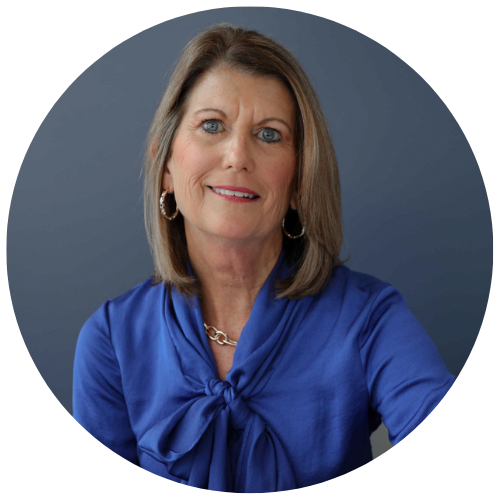
Susie McEuen

Rob Roach
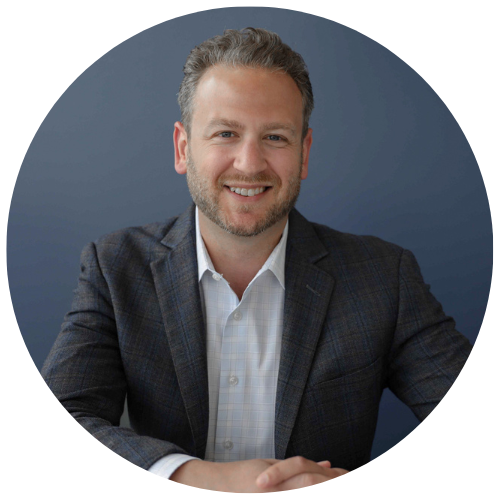
Adam Farag
